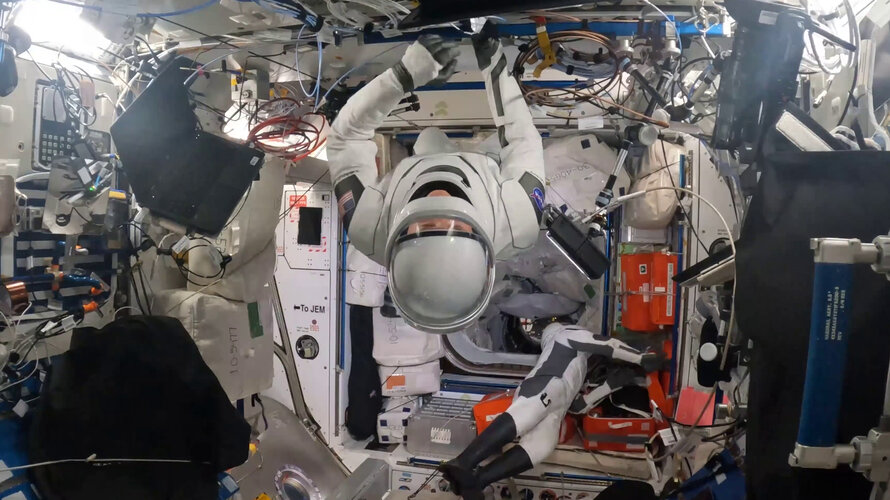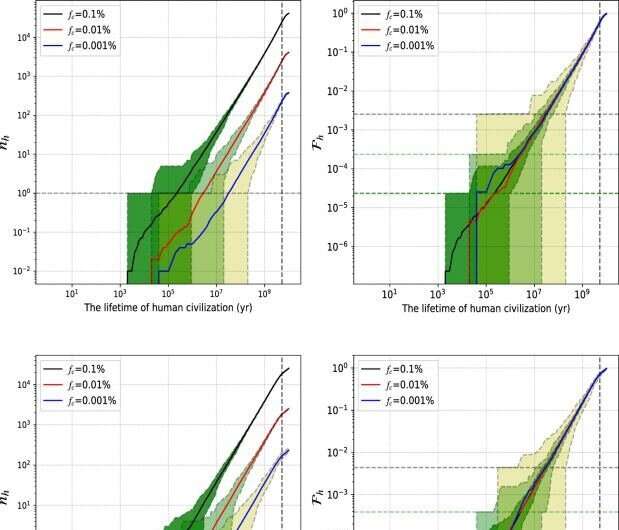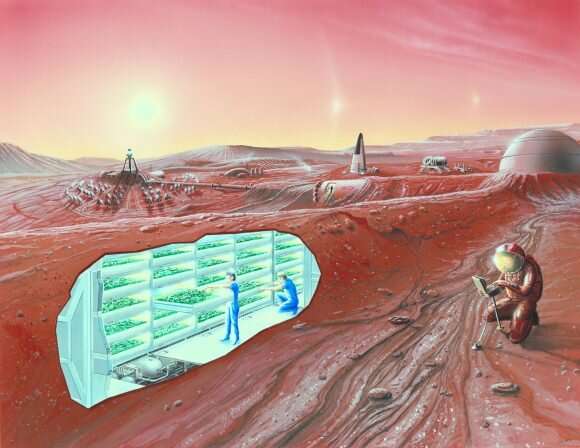
Copernical Team
Meteor showers to bookend overnight skywatching opportunities in May
 As the spring season continues, May could prove to be of great interest for stargazers and space enthusiasts - with a pair of potentially active meteor showers opening and closing the month.
"Meteors aren't uncommon," Bill Cooke said, who leads NASA's Meteoroid Environment Office at NASA's Marshall Space Flight Center in Huntsville, Alabama. "Earth is bombarded every day by millions of bit
As the spring season continues, May could prove to be of great interest for stargazers and space enthusiasts - with a pair of potentially active meteor showers opening and closing the month.
"Meteors aren't uncommon," Bill Cooke said, who leads NASA's Meteoroid Environment Office at NASA's Marshall Space Flight Center in Huntsville, Alabama. "Earth is bombarded every day by millions of bit UNC blood clot expert working with NASA to study blood and clots in zero gravity
 Are astronauts more likely to develop blood clots during space missions due to zero gravity? That's the question NASA is trying to answer with help from UNC School of Medicine's Stephan Moll, MD, professor in the UNC Department of Medicine. A new publication in Vascular Medicine shows the results of an occupational surveillance program spurred by the development of a deep vein thrombosis (DVT) i
Are astronauts more likely to develop blood clots during space missions due to zero gravity? That's the question NASA is trying to answer with help from UNC School of Medicine's Stephan Moll, MD, professor in the UNC Department of Medicine. A new publication in Vascular Medicine shows the results of an occupational surveillance program spurred by the development of a deep vein thrombosis (DVT) i BRICS forum on big data for sustainable development held in Beijing
 The BRICS Forum on Big Data for Sustainable Development was held both in Beijing and online on April 26, 2022. The two-day event was hosted by Chinese Academy of Sciences (CAS), Academy of Science of South Africa, Brazilian Academy of Sciences, Russian Academy of Sciences, and Indian National Science Academy.
The forum was proposed by Chinese President Xi Jinping during his remarks at the
The BRICS Forum on Big Data for Sustainable Development was held both in Beijing and online on April 26, 2022. The two-day event was hosted by Chinese Academy of Sciences (CAS), Academy of Science of South Africa, Brazilian Academy of Sciences, Russian Academy of Sciences, and Indian National Science Academy.
The forum was proposed by Chinese President Xi Jinping during his remarks at the GomSpace to supply mission control system for KSAT Arctic satellites
 GomSpace to deliver the Mission Control System that KSAT will use to operate the Arctic Weather Satellite
Today, GomSpace signed a contract to develop, deliver and support the Mission Control System that KSAT will use to operate the Arctic Weather Satellite mission.
The contract value is 10 MSEK and the majority of work will be done this year and next year.
The Arctic Weather S
GomSpace to deliver the Mission Control System that KSAT will use to operate the Arctic Weather Satellite
Today, GomSpace signed a contract to develop, deliver and support the Mission Control System that KSAT will use to operate the Arctic Weather Satellite mission.
The contract value is 10 MSEK and the majority of work will be done this year and next year.
The Arctic Weather S NASA's Mars Helicopter scouts ridgeline for Perseverance science team
 NASA's Ingenuity Mars Helicopter recently surveyed an intriguing ridgeline near the ancient river delta in Jezero Crater. The images - captured on April 23, during the tiny helicopter's 27th flight - were taken at the request of the Perseverance Mars rover science team, which wanted a closer look at the sloping outcrop.
"Ingenuity not only provides imagery from an aerial perspective, but a
NASA's Ingenuity Mars Helicopter recently surveyed an intriguing ridgeline near the ancient river delta in Jezero Crater. The images - captured on April 23, during the tiny helicopter's 27th flight - were taken at the request of the Perseverance Mars rover science team, which wanted a closer look at the sloping outcrop.
"Ingenuity not only provides imagery from an aerial perspective, but a Stanford scientists describe a gravity telescope that could image exoplanets
 In the time since the first exoplanet was discovered in 1992, astronomers have detected more than 5,000 planets orbiting other stars. But when astronomers detect a new exoplanet, we don't learn a lot about it: we know that it exists and a few features about it but the rest is a mystery.
To sidestep the physical limitations of telescopes, Stanford University astrophysicists have been workin
In the time since the first exoplanet was discovered in 1992, astronomers have detected more than 5,000 planets orbiting other stars. But when astronomers detect a new exoplanet, we don't learn a lot about it: we know that it exists and a few features about it but the rest is a mystery.
To sidestep the physical limitations of telescopes, Stanford University astrophysicists have been workin Spacesuit waltz | Cosmic Kiss
 Video:
00:01:27
Video:
00:01:27
Join ESA astronaut Matthias Maurer, and his Crew-3 mates NASA astronauts Kayla Barron, Raja Chari and Thomas Marshburn, as they check out their Crew Dragon launch and entry suits before they return to Earth.
The spacesuits are custom-made for each crew member and protect the astronauts from potential fire and depressurisation in the crew capsule. A single connection point on the thigh, connects the spacesuits to the life support system that supplies the astronauts with oxygen and power, as well as cooling and communication systems.
The suits are equipped with touchscreen-compatible gloves and a flame-resistant outer layer and can
NASA sets mid-May launch for Boeing Starliner spacecraft's initial trip to ISS
 Boeing's Starliner spacecraft may finally get off the ground for its second flight following an issue with the craft's propulsion system.
The capsule, designed to ferry astronauts to and from the International Space Station, is set to launch on its second uncrewed test flight on May 19, company officials confirmed during a teleconference on Tuesday.
The mission, Orbital Flight Te
Boeing's Starliner spacecraft may finally get off the ground for its second flight following an issue with the craft's propulsion system.
The capsule, designed to ferry astronauts to and from the International Space Station, is set to launch on its second uncrewed test flight on May 19, company officials confirmed during a teleconference on Tuesday.
The mission, Orbital Flight Te Humanity will need to survive about 400,000 years if we want any chance of hearing from an alien civilization

If there are so many galaxies, stars, and planets, where are all the aliens, and why haven't we heard from them? Those are the simple questions at the heart of the Fermi Paradox. In a new paper, a pair of researchers ask the next obvious question: How long will we have to survive to hear from another alien civilization?
Their answer? 400,000 years.
Which parts of Mars are the safest from cosmic radiation?

In the coming decade, NASA and China plan to send the first crewed missions to Mars. This will consist of both agencies sending spacecraft in 2033, 2035, 2037, and every 26 months after that to coincide with Mars opposition (i.e., when Earth and Mars are closest in their orbits). The long-term aim of these programs is to establish a base on Mars that will serve as a hub that accommodates future missions, though the Chinese have stated that they intend for their base to be a permanent one.
The prospect of sending astronauts on the six- to nine-month journey to Mars presents several challenges, to say nothing of the hazards they'll face while conducting scientific operations on the surface. In a recent study, an international team of scientists conducted a survey of the Martian environment—from the peaks of Mount Olympus to its underground recesses—to find where radiation is the lowest.

